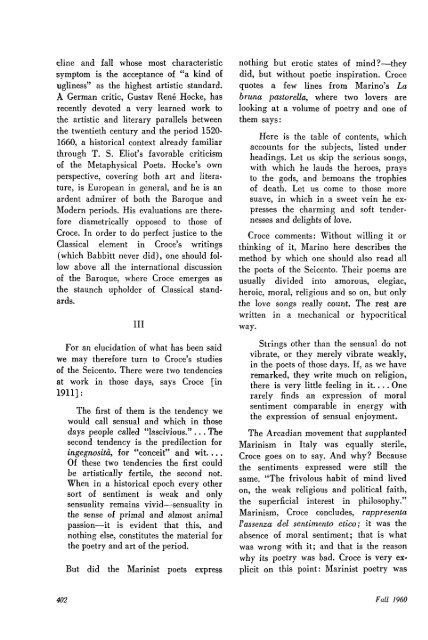Irving Babbitt the Aestheticians
Irving Babbitt the Aestheticians
Irving Babbitt the Aestheticians
You also want an ePaper? Increase the reach of your titles
YUMPU automatically turns print PDFs into web optimized ePapers that Google loves.
cline and fall whose most characteristic<br />
symptom is <strong>the</strong> acceptance of “a kind of<br />
ugliness” as <strong>the</strong> highest artistic standard.<br />
A German critic, Gustav Ren6 Hocke, has<br />
recently devoted a very learned work to<br />
<strong>the</strong> artistic and literary parallels between<br />
<strong>the</strong> twentieth century and <strong>the</strong> period 1520-<br />
1660, a historical context already familiar<br />
through T. S. Eliot’s favorable criticism<br />
of <strong>the</strong> Metaphysical Poets. Hocke’s own<br />
perspective, covering both art and litera-<br />
ture, is European in general, and he is an<br />
ardent admirer of both <strong>the</strong> Baroque and<br />
Modern periods. His evaluations are <strong>the</strong>re-<br />
fore diametrically opposed to those of<br />
Croce. In order to do perfect justice to <strong>the</strong><br />
Classical element in Croce’s writings<br />
(which <strong>Babbitt</strong> never did), one should fol-<br />
low above all <strong>the</strong> international discussion<br />
of <strong>the</strong> Baroque, where Croce emerges as<br />
<strong>the</strong> staunch upholder of Classical stand-<br />
ards.<br />
I11<br />
For an elucidation of what has been said<br />
we may <strong>the</strong>refore turn to Croce’s studies<br />
of <strong>the</strong> Seicento. There were two tendencies<br />
at work in those days, says Croce [in<br />
19111 :<br />
The first of <strong>the</strong>m is <strong>the</strong> tendency we<br />
would call sensual and which in those<br />
days people called LLlascivious.’’ . . . The<br />
second tendency is <strong>the</strong> predilection for<br />
ingegnositci, for ‘Lconceit” and wit. . . .<br />
Of <strong>the</strong>se two tendencies <strong>the</strong> first could<br />
be artistically fertile, <strong>the</strong> second not.<br />
When in a historical epoch every o<strong>the</strong>r<br />
sort of sentiment is weak and only<br />
sensuality remains vivid-sensuality in<br />
<strong>the</strong> sense of primal and almost animal<br />
passion-it is evident that this, and<br />
nothing else, constitutes <strong>the</strong> material for<br />
<strong>the</strong> poetry and art of <strong>the</strong> period.<br />
But did <strong>the</strong> Marinist poets express<br />
nothing but erotic states of mind?-<strong>the</strong>y<br />
did, but without poetic inspiration. Croce<br />
quotes a few lines from Marino’s La<br />
bruna pastorella, where two lovers are<br />
looking at a volume of poetry and one of<br />
<strong>the</strong>m says:<br />
Here is <strong>the</strong> table of contents, which<br />
accounts for <strong>the</strong> subjects, listed under<br />
headings. Let us skip <strong>the</strong> serious songs,<br />
with which he lauds <strong>the</strong> heroes, prays<br />
to <strong>the</strong> gods, and bemoans <strong>the</strong> trophies<br />
of death. Let us come to those more<br />
suave, in which in a sweet vein he ex-<br />
presses <strong>the</strong> charming and soft tender-<br />
nesses and delights of love.<br />
Croce comments: Without willing it or<br />
thinking of it, Marino here describes <strong>the</strong><br />
method by which one should also read all<br />
<strong>the</strong> poets of <strong>the</strong> Seicento. Their poems are<br />
usually divided into amorous, elegiac,<br />
heroic, moral, religious and so on, but only<br />
<strong>the</strong> love songs really count. The rest are<br />
written in a mechanical or hypocritical<br />
way.<br />
Strings o<strong>the</strong>r than <strong>the</strong> sensual do not<br />
vibrate, or <strong>the</strong>y merely vibrate weakly,<br />
in <strong>the</strong> poets of those days. If, as we have<br />
remarked, <strong>the</strong>y write much on religion,<br />
<strong>the</strong>re is very little feeling in it. . . . One<br />
rarely finds an expression of moral<br />
sentiment comparable in energy with<br />
<strong>the</strong> expression of sensual enjoyment.<br />
The Arcadian movement that supplanted<br />
Marinism in Italy was equally sterile,<br />
Croce goes on to say. And why? Because<br />
<strong>the</strong> sentiments expressed were still <strong>the</strong><br />
same. “The frivolous habit of mind lived<br />
on, <strong>the</strong> weak religious and political faith,<br />
<strong>the</strong> superficial interest in philosophy.”<br />
Marinism, Croce concludes, rappresenta<br />
I‘assenza del sentimento etico; it was <strong>the</strong><br />
absence of moral sentiment; that is what<br />
was wrong with it; and that is <strong>the</strong> reason<br />
why its poetry was bad. Croce is very ex-<br />
plicit on this point: Marinist poetry was<br />
Po2 Fall 1960
















